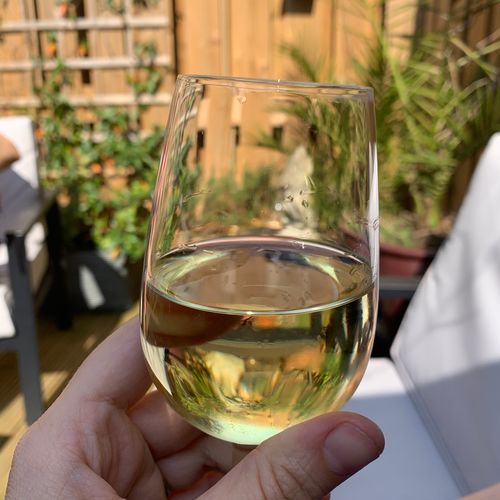
Why isn’t all wine vegan?
What? Some wine isn’t vegan?
No, it’s true. Despite wine being essentially alcoholic grape juice, a lot of it isn’t vegan at all.
Why isn’t all wine vegan then?
One of the stages in wine making is clarification, where suspended solids are removed from the wine to improve its clarity. These solids include things like dead yeast cells, grape fragments, tannins and proteins. Most wines will clarify themselves if left long enough, however this process can be speeded up using filtration and/or fining. Filtration is a simple physical process that removes larger sediment particles from the wine; whereas fining is a process where a substance (the fining agent) is added to the wine to remove these sediments. The fining agent binds with the suspended solids to create larger particles that precipitate out of the wine much quicker than they would naturally.
It’s these fining agents that are the problem as a lot of them are derived from animals. So a lot of wine isn’t even vegetarian, which may also come as a surprise. Common non-vegan fining agents include:
- Gelatine (derived from animal skin and connective tissue).
- Isinglass (derived from fish bladders).
- Albumen (egg whites).
- Casein (milk proteins).
In the past, animal blood was a common fining agent. Thankfully this is hardly/never used any more and in fact, it has been banned in European and US winemaking since 1987. So as long as you stay away from those 30 plus year old vintages, you should be fine!
Why didn’t I know this?
Wine makers do not have to include information on what fining agents they use. EU regulations only stipulate that wines fined using milk or egg products (both allergens) must be clearly labelled as explained by the Food Standards Agency.
Some retailers now label their own brand wine as vegan friendly (notably Co-op, M&S, Sainsbury’s and Waitrose), but this does not extend to all the other wines they sell.
So, what makes wine vegan?
Wines can be vegan if they are left to clarify naturally or if the clarification process uses vegan fining agents. There are a number of different fining agents that can be used which are vegan and much more natural. The most common ones are:
- Bentonite clay
- Activated charcoal
- Silica gel
Leaving wine to clarify naturally takes longer and relies on gravity to settle the sediment at the bottom of the barrels, so that the clear wine can be carefully removed and bottled. Wine needs to be aged for a couple of years in barrels before it is clear enough to be bottled without any filtration/fining. This approach can mean the wine isn’t as clear as when fining agents are used, although you could argue this is the wine in its truest state as nothing has been added.
This leads us on to a growing trend in natural winemaking, which does not fine or filter the wine. A lot of winemakers will proudly label their wines as unfiltered or unfined so you know it is free of animal bits. You should also look out for variants of this in other languages, for example: non-filtre (French wines), sins-filtrar (Spanish wines) or non-filtrato (Italian wines).
A word of warning though; even though natural wine is vegan it doesn’t mean that organic and biodynamic wines are always vegan friendly. Organic and biodynamic purely refers to the way in which the grapes are grown, not the processing involved.
Cheers!